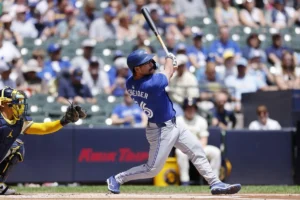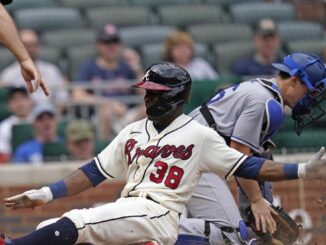
When front office executives assemble their daily lineup, they often face a challenging decision: Should the offense prioritize power hitting or emphasize contact and speed?
In today’s game, a growing number of teams prioritize power. They prefer a roster that minimizes risks on the basepaths, avoids bunting, and relies on home runs to change the game.
Conversely, other teams may have a couple of power hitters but focus mainly on putting the ball in play. They encourage aggressive baserunning, aim to reduce strikeouts, and put pressure on opposing defenses.
The Milwaukee Brewers recently demonstrated the ability to balance both approaches. They hit home runs while showcasing an offense capable of scoring through various means. This versatility is something the struggling Blue Jays envy.
The Jays’ lineup struggled until a ninth-inning rally on Wednesday salvaged some offense in a 5-4 loss to the Brewers. This has been a recurring issue for a team that wasted another strong performance from Chris Bassitt, who has pitched 15 consecutive scoreless innings without a win.
After Davis Schneider’s solo home run gave them a 1-0 lead, the Jays maintained it until the sixth inning. Relief pitcher Zach Pop retired two batters, but then Blake Perkins walked and Brice Turang singled, putting runners at the corners. The Brewers capitalized on their speed: Turang stole second, and when Alejandro Kirk’s throw was mishandled, Perkins scored to tie the game. William Contreras and Christian Yelich added RBIs before Willy Adames hit a crucial home run.
The Brewers’ sixth inning epitomized their approach: they don’t rely heavily on home runs but slug effectively enough. They rank 12th in the league with 71 home runs and boast a balanced offensive profile with high on-base percentage, slugging, and stolen bases.
In contrast, the Jays struggle in multiple offensive categories. They rank poorly in home runs (26th), on-base percentage (19th), slugging (25th), and stolen bases (21st), contributing to their lower run production compared to the Brewers.
The disparity is reflected in their respective runs per game averages: the Brewers average 4.87 runs (7th in MLB), while the Jays average 3.91 (25th). This gap underscores why the Brewers are contenders and the Jays are below .500. The Jays’ record significantly improves when they score at least four runs but falters when they don’t, highlighting their inconsistency.

Despite a late surge on Wednesday, spurred by Spencer Horwitz and Bo Bichette, the Jays fell short in their comeback attempt. This outcome is disappointing for a team expected to be beyond such moral victories and focused on accumulating wins.
After struggling offensively for over a year, it’s clear the Jays need external help to bolster their lineup, especially before the trade deadline. The recent improvement in performance is encouraging, but the team must prove it can compete consistently against stronger opponents to dispel doubts about their ability to contend.
In contrast, the Brewers’ lineup is versatile and effective, capable of winning games in multiple ways. The Jays, lacking a clear offensive identity, face an uncertain postseason fate unless they acquire additional firepower soon.



Be the first to comment